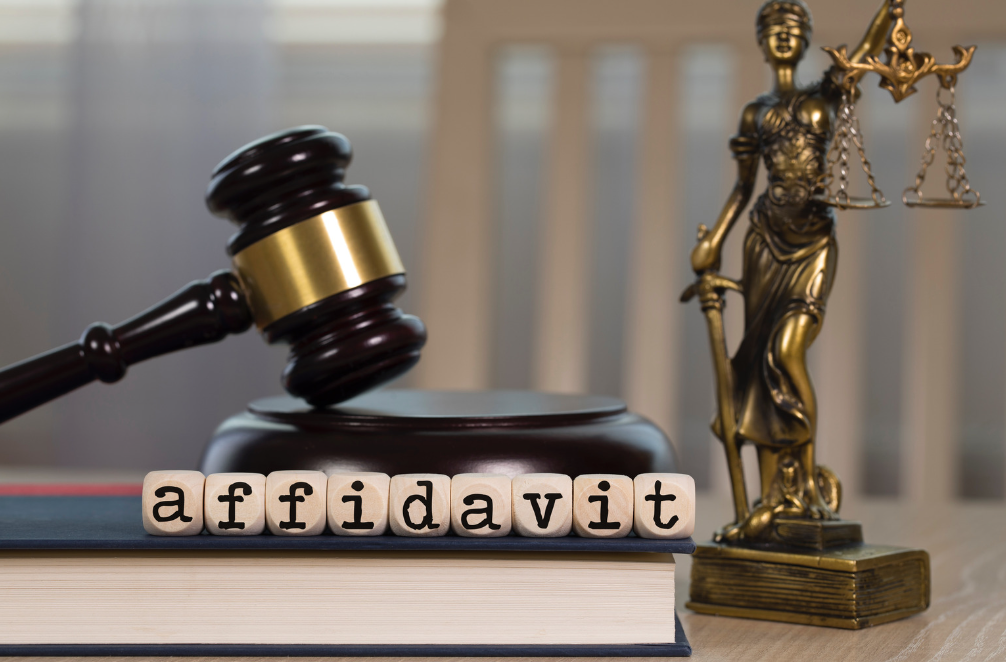Affidavit Example

An affidavit is a critical legal document, often serving as the foundation for presenting sworn facts in various legal and professional scenarios. These documents are typically written statements made under oath, providing a reliable method to verify claims, offer evidence, or satisfy legal requirements in cases ranging from personal disputes to corporate matters.
What is an Affidavit?
- Definition and Purpose: An affidavit is a written declaration of facts made under oath, signed by the affiant, and notarized to ensure authenticity. This sworn document is used in legal cases, administrative procedures, and personal matters where a formal statement of truth is necessary.
- Versatility in Legal Contexts: Affidavits are employed in numerous cases, such as supporting claims in family court or substantiating facts in criminal investigations, such as how to check for warrants for your arrest.
- Accountability Through Oath: The affiant’s acknowledgment under penalty of perjury underscores the affidavit’s credibility and legal significance.
For those navigating legal complexities, affidavits can clarify intricate matters, as seen in cases involving legal implications of notarized contracts.
Key Components of an Affidavit
- Clear Identification: Each affidavit must identify the affiant, including full name, address, and other relevant personal details.
- Chronological Organization: Facts are presented in a clear, structured manner to support the intended purpose.
- Notarization: Notarization ensures the affidavit’s legality, validating it as a trusted document.
Affidavits often come into play in sensitive legal matters, such as sexting among students, where clear and truthful documentation is paramount.
Practical Applications of Affidavits
- Affidavit of Residence: Used in proving domicile for legal, educational, or financial purposes.
- Financial Affidavits: Essential in cases involving financial disclosures, such as divorce proceedings or visa applications.
- Affidavit of Identity: Commonly required in identity verification processes for business or legal transactions.
The importance of such documents is highlighted in situations like what is the legal alcohol limit, where precise and reliable declarations are essential for compliance.
The Role of Affidavits in Legal Processes
- Evidence in Absence: Affidavits allow individuals to present their testimony without being physically present in court, saving time and resources.
- Foundation for Legal Claims: They substantiate claims in disputes, ensuring clarity and transparency for all parties involved.
- Strengthening Business Agreements: Affidavits play a role in business contexts, such as verifying ownership or confirming contract terms.
They also have a significant role in property-related issues, as highlighted in real estate contract disputes.
Risks and Responsibilities
- Perjury Penalties: False statements in affidavits can lead to criminal charges, emphasizing the need for accuracy and honesty.
- Legal Binding: Once signed and notarized, affidavits become legally enforceable, obligating the affiant to uphold their statement.
- Practical Considerations: Affidavits must be drafted carefully to avoid ambiguities that could weaken their effectiveness in legal contexts.
Affidavits are critical in navigating complex issues, such as would buying the domain name mature-tube infringe, providing the clarity needed for informed decision-making.
Why Affidavits Are Indispensable
- Efficiency in Legal Procedures: They reduce the burden of verbal testimonies, streamlining the legal process.
- Trust and Credibility: The notarized nature of affidavits enhances their reliability, making them indispensable in disputes and negotiations.
- Ease of Documentation: Affidavits offer a straightforward way to formalize declarations, facilitating quicker resolutions to legal challenges.
Conclusion
Affidavits are not just documents—they are the backbone of truth and reliability in legal, financial, and administrative matters. By understanding their structure, application, and legal implications, individuals and businesses can leverage affidavits to safeguard their interests and achieve desired outcomes.
For instance, affidavits are instrumental when addressing legal questions like how much is divorce, offering clarity and precision in delicate matters.

Related Items:





